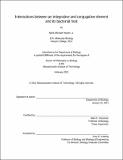Interactions between an integrative and conjugative element and its bacterial host
Author(s)
Harden, Mark Michael,Jr.
Download1251767251-MIT.pdf (1.507Mb)
Other Contributors
Massachusetts Institute of Technology. Department of Biology.
Advisor
Alan D. Grossman.
Terms of use
Metadata
Show full item recordAbstract
Conjugative elements are mobile genetic elements that can transfer from a donor bacterium to a recipient via an element-encoded type IV secretion system. Integrative and conjugative elements (ICEs) are an abundant class of conjugative element. ICEs are typically integrated into the bacterial host chromosome, but under certain conditions, or stochastically, they can excise from the chromosome and transfer to a recipient. ICEs likely interact with their bacterial host at every stage of their life cycle, but few of these interactions have been characterized. In this work I sought to 1) identify bacterial host factors necessary for efficient transfer of the integrative and conjugative element ICEBs1 to a recipient, and 2) determine whether the ICEBs1-encoded cell wall-modifying enzyme CwlT acts on the cell wall of the donor bacterium, the recipient bacterium, or both. I used CRISPR interference to induce a knockdown of individual essential Bacillus subtilis genes, and then screened for gene knockdowns that caused an acute defect in transfer of ICEBs1. I found that wall teichoic acids were necessary in both ICEBs1 donors and recipients for efficient conjugative transfer. I found that depletion of wall teichoic acids caused cells involved in ICEBs1 conjugation to sustain lethal envelope damage caused by active conjugation machinery. Conjugative elements must bypass the cell wall of both the donor and recipient cells in a mating pair. Conjugative elements encode cell wall hydrolases that are required for efficient transfer, which are presumed to partly degrade the cell wall of the donor bacterium during conjugation. In order to investigate the role of the ICEBs1-encoded cell wall hydrolase CwlT in conjugation, I generated cell wall-less (L-form) strains of B. subtilis which could donate or receive ICEBs1. In the absence of either the donor or recipient cell wall, CwlT was dispensable for efficient transfer. This finding indicates that CwlT acts on both the donor and recipient cell wall in a mating pair.
Description
Thesis: Ph. D., Massachusetts Institute of Technology, Department of Biology, February, 2021 Cataloged from the official PDF of thesis. Includes bibliographical references.
Date issued
2021Department
Massachusetts Institute of Technology. Department of BiologyPublisher
Massachusetts Institute of Technology
Keywords
Biology.